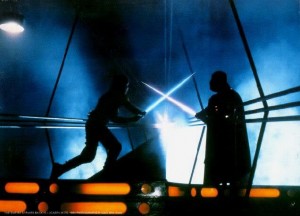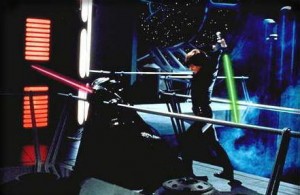Star Wars & the Problem of Evil
Darth Vader: God’s Tool?
 We’ve spent a week’s worth of posts forcing the Star Wars narrative to reveal its secrets, and Redemption by the Son is perhaps Star Wars most powerful message (and will always be the climax to the trilogy, or sextet, whichever you prefer). It is curious, however, to see new elements emerging from the prequels. In Episode 1, we find out that Anakin Skywalker is created by mysterious, symbiotic organisms; he has a destiny, and Mace Windu mentions a prophecy of a “chosen one”, who will bring balance to the force. However, we know that in the following two prequels Anakin falls, embraces the dark side, becomes Darth Vader, and crushes the Jedi Council. He nearly destroys their order, while effectively only Ben and Yoda will survive. Without the original trilogy to shine some light on the story, these prequels will look pretty bleak.
We’ve spent a week’s worth of posts forcing the Star Wars narrative to reveal its secrets, and Redemption by the Son is perhaps Star Wars most powerful message (and will always be the climax to the trilogy, or sextet, whichever you prefer). It is curious, however, to see new elements emerging from the prequels. In Episode 1, we find out that Anakin Skywalker is created by mysterious, symbiotic organisms; he has a destiny, and Mace Windu mentions a prophecy of a “chosen one”, who will bring balance to the force. However, we know that in the following two prequels Anakin falls, embraces the dark side, becomes Darth Vader, and crushes the Jedi Council. He nearly destroys their order, while effectively only Ben and Yoda will survive. Without the original trilogy to shine some light on the story, these prequels will look pretty bleak.
However, ultimately touched by the love of the son, we know Vader also destroys the Emperor, ending the reign of the Sith.
One of my friends suggests that the council’s supposition is premature—that Luke Skywalker, not Anakin, is the “chosen one”. After all, Vader is evil, and couldn’t possibly be used for good…right? Another colleague speculates a yin/yang philosophy—that Vader is the chosen one, tearing apart good and bad to achieve a “balance”—sort of karmic housecleaning. I must disagree with both hypotheses, although both of them aren’t far from the mark.
 Christians acknowledge a God that directs sin, though he is without it and abhors it. I’ll let Puritan Theologian Jonathan Edwards explain:
Christians acknowledge a God that directs sin, though he is without it and abhors it. I’ll let Puritan Theologian Jonathan Edwards explain:
“If by ‘the author of sin,’ be meant the sinner, the agent, or the actor of sin, or the doer of a wicked thing . . . it would be a reproach and blasphemy, to suppose God to be the author of sin. In this sense, I utterly deny God to be the author of sin.”
God is, Edwards says, “the permitter . . . of sin; and at the same time, a disposer of the state of events, in such a manner, for wise, holy and most excellent ends and purposes, that sin, if it be permitted . . . will most certainly and infallibly follow.”
Since sin is present in the world and permitted—God uses it. The Egyptian Pharaoh in Moses’ time, the Babylonians, the Assyrians, Rome and many others were used in such a fashion. God prophesied and brought to pass the death of Jesus Christ by way of human sin. God, with future foreknowledge, affects sinners, so that even their evil actions ultimately bring about God’s greater good.
It stands upon this Christian tenant, then, that similarly Darth Vader very well could be a “chosen one”; after all, God works through fallen man. The nation of Israel is another good example. They were not righteous—often sinning—but God sovereignly selected them to accomplish his goals. Much like these sinful, often rebellious offspring of Abraham, Anakin/Vader carries out an agenda different from either Jedi or Sith. He demolishes the flawed, eastern-influenced, ascetic religious order of the Jedi, paving the way and circumstances for the coming of the Son… the seed of Anakin, much like Christ descended from the seed of Abraham.
 Like Israel, Darth Vader has fallen into captivity, and—like all men—fallen away from the truth; only the redemptive work of the Son frees him, and destroys sin—whoops, I mean the Sith. So both Anakin and Luke are “chosen ones”; the former is the fallen man, an instrument used by God according to his purpose, and the latter is the Son, the virtuous agent that redeems the fallen man.
Like Israel, Darth Vader has fallen into captivity, and—like all men—fallen away from the truth; only the redemptive work of the Son frees him, and destroys sin—whoops, I mean the Sith. So both Anakin and Luke are “chosen ones”; the former is the fallen man, an instrument used by God according to his purpose, and the latter is the Son, the virtuous agent that redeems the fallen man.
At the end of all these films, what is left? The only potential Jedi left are Luke and Leia (and Leia’s predicted offspring with a reformed Han Solo). Force theology has been reborn in the likeness of a family—a relationship—a community based on love, cooperation, and emotional stability. The old choices—selfish (western) hedonism and (eastern) emotional detachment—have been swept away in favor of a Believer’s model… the type of system the Christian church seeks to emulate.
And in our final post, we’ll see how this gives us a New Hope.


Vader as Israel in captivity? Excellent!
These posts have achieved the impossible: they’ve made me excited to watch Star Wars again. Cute toys/prequels/special-effects-updates have severely diminished my interest. But I’m seriously psyched to watch them again with this view of the old man/new man tension.
good to hear Mickey… just like I refuse to let the Matrix sequels sour what was one of the most amazing films of the 90s, I refuse to let Jar Jar Binks ruin my childhood. We’re planning a Star Wars themed party in the future where the cake is Jar Jars head on a platter:)
Anakin/Vader definitely balances out the Force by effectively bringing about the liquidation of both groups. That this happens by rejecting the asceticism of Sith and Jedi alike and rebooting the way the Force is used is a fun observation. Doesn’t make me like the prequels even the slightest bit more … but I like your take on them. 🙂
The irony across the sextet is that regard for family is what causes Anakin’s fault yet regard for family is what saves Luke and it is the self-preserving and self-sacrificing impulse in father and son respectively that reach their narrative focal point at the arrogance of the Emperor in Return of the Jedi.
Jar Jar’s head on a platter? I’d love to be at that party and that’s a cake that needs photographic documentation!